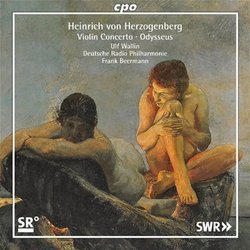| All Artists: Herzogenberg, Deutsche Radio Phil, Beermann Title: Violin Concerto / Odysseus Members Wishing: 0 Total Copies: 0 Label: Cpo Records Original Release Date: 1/1/2010 Re-Release Date: 4/27/2010 Genre: Classical Style: Symphonies Number of Discs: 1 SwapaCD Credits: 1 UPC: 761203728022 |
Search - Herzogenberg, Deutsche Radio Phil, Beermann :: Violin Concerto / Odysseus
 | Herzogenberg, Deutsche Radio Phil, Beermann Violin Concerto / Odysseus Genre: Classical
|
Larger Image |
CD DetailsSimilar CDs |
CD ReviewsLate German Romanticism D. A Wend | Buffalo Grove, IL USA | 06/16/2010 (4 out of 5 stars) "I was unfamiliar with Henrich von Herzogenberg prior to this recording. My interest in it was for the Odysseus Symphony, being curious how the composer would approach the story in music. The Violin Concerto is first on the disc. It is the only extant concerto by Herzogenberg: a cello concerto and piano concerto are lost.
Herzogenberg had Joseph Joachim in mind when he wrote the concerto in 1889. The score was sent to the famous violinist who confessed that he didn't like the concerto. Herzogenberg was not surprised by this and revised the concerto. The revised score was sent to Joachim but that was the end of it. Both autograph scores were found among Joachim's papers following his death in 1907. The second score was edited and had its premiere in 2008. The concerto has the music of Brahms and Mendelssohn as its model. It lyrical and more serenade like throughout the concertos three movements. There is a long introduction before the soloist enters with a charming melody that is elaborated upon by the orchestra and soloist. The music is sweet but not overly sentimental. The original cadenza has been lost, Ulf Wallin supplied his own for this premiere recording, and he nicely demonstrates his virtuosic skills. The middle movement is an Andante with a melancholy melody that is gradually developed into a dramatic climax. The third movement is a rondo with a lively melody announced by the soloist and picked up by orchestra and soloist. The second melody is stately and more reflective. Listening to the concerto, one can understand why Joachim did not care for it: there are few opportunities for the soloist to shine. Overall, the concerto has appealing melodies. Odysseus was composed in 1872 following some early attempts at symphony writing by the composer that were not published. Herzogenberg was at odds on whether he should follow the new German music, as represented by Wagner, or the more conservative approach of Brahms. Eventually, the composer chose to follow the example of Brahms. The Odysseus symphony, however, was his effort at coming to terms with Wagner's music. The first movement clocks in at almost twenty minutes entitled Wanderings, in reference to the many years Odysseus wandered the sea and was often shipwrecked. The music opens with a brooding melody that becomes more impassioned as the music is developed and gradually diminishes until it fades away. The second movement is entitled Penelope after Odysseus' long suffering wife. A brooding melody opens this movement and slowly changes to one of longing and melancholy. The third movement, acting as a Scherzo, is named The Gardens of Circe. The music begins with the horns painting a bucolic landscape. The music becomes voluptuous in sound, with shimmering trills from the woodwinds. The Finale concerns the Feast of the Suitors. From the beginning, a celebratory atmosphere pervades taking on a more heroic tone as Odysseus enters the hall in disguise and eventually reveals himself. We are left at a dramatic moment in the poem, just before Odysseus takes his revenge on the suitors. Odysseus is more grounded in the influence of Wagner than forward looking to Richard Strauss and Gustav Mahler, as the notes suggest. The music is suitable for the action that is being portrayed with the Gardens of Circe being, for me, the most original of the movements. What music Herzogenberg might have written had he pursued a more modern trend in music is a tantalizing question. The music is beautifully performed and the recording balance is excellent. This disc will be of interest to those who love later German romantic music. " |

 Track Listings (7) - Disc #1
Track Listings (7) - Disc #1